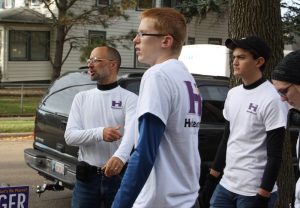Senate Education amended Senate Bill 134 yesterday. What was originally a blanket ban on any political speech in public schools is now a slightly more targeted but still problematic ban on political advocacy.
Proponent testimony in committee yesterday revealed that SB 134 really is just backlash against those darn teachers and the sales increase we passed last year to raise their pay. A clutch of Black Hills conservatives clucked about teachers and administrators sending e-mails and messages from their students urging legislators to vote for last year’s sales tax hike.
Prime sponsor Senator Lance Russell (R-30/Hot Springs) brought an amendment to committee that got rid this overly broad sentence:
No public school resources, including personnel time, supplies, communication systems, or facilities may be used to affect the outcome of any political vote [SB 134 original].
…and replaced it with this only slightly less overbroad sentence:
No public school resources, including personnel time, supplies, or written electronic communication systems may be used to advocate for an outcome of any partisan election or any vote of the Legislature [SB 134 amended].
Now I’m not sure about the full legal import of the word including, but grammatically, I contend that “No public school resources” is still the governing phrase. “Including” gives examples, but it does not exclude other public school resources. Russell’s amendment may not mention “facilities,” but facilities are still public school resources and are still banned from use for advocacy by the amended SB 134.
“Advocate” appears to alleviate the concern that SB 134 would ban civics class and debate tournaments, which educate students and affect the outcome of all of their future votes by making them smarter, more articulate citizens. However, SB 134 still prevents any public school from hosting a crackerbarrel or candidate forum at which participants might advocate for votes one way or another.

SB 134 still bans students from presenting papers or speeches in school advocating for political candidates or Legislative issues. It might even ban students from wearing their favorite candidate’s t-shirt to school, since students would still be taking advantage of the school’s space and time to advocate for their choice for Senate or Governor.
The new language also creates an odd gap that exposes the partial redundancy of SB 134. As amended, SB 134 seems to say it’s o.k. for teachers, administrators, and students to campaign on school time for school board, city commission, judge, and sanitary district candidates. Of course, such advocacy, along with partisan campaigning, is already sufficiently covered by SDCL 12-27-20, which bans the expenditure of public funds to influence elections.
SB 134 remains overbroad and unnecessary. It passed Senate Ed 4–2 (mostly on anti-public education yahoo vote), but the Senate should sweep this bill into the dustbin and get to work finding money to preserve last year’s necessary teacher pay raises… and maybe for that new SDSU animal science laboratory.
I’m not a fan of anyone using tax-funded resources for any political purpose, so I’d broaden the bill out to include every official and bureaucrat at every level of government. On the other hand, there are incidental discussions, where you text someone or have a phone discussion the ventures into some political question, that aren’t of concern. The biggest violators of using taxpayer funded facilities for political purposes, by the way, are elected officials, not teachers.
What about in the case of an opt out or a bond referral to tax payers? Are school staff not able to inform the public? Isn’t it school administrators and business managers’ jobs to inform the public?
Concerned, the current law on expenditure of public resources for campaigns already covers that situation. Current statute distinguishes advocacy from information: you can inform, but you can’t advocate. Note that, with the new amendment, SB 134 doesn’t touch local opt-out votes; it only bans speech in school on partisan contests (county commission, Legislative races, state offices, Congress, President) and on votes in the Legislature. Technically, SB 134 by itself does not stop a school administrator from using her school e-mail to send out messages encouraging people to vote certain city commission or school board candidates.
Agreed, Donald. I’m perfectly fine with the existing statute that prevents use of public resources for campaign activities (although I still wouldn’t mind making an exception for IM22’s Democracy Credits!). And yes, teachers have far less power to abuse (and generally less inclination to abuse it) than our elected officials.
I contend that “No public school resources”
Couldn’t you like give tax credits to Insurance Companies and have them do the political campaigns-kinda like the way Daugaard circumvents giving public school resources (money) to religious schools?
It is painfully clear that some Senators DO NOT want to hear from our children including Senators Bolin, Monroe, Phil Jenson, and Klumb. There is a solution to their problem – vote the out!
So what if speaking in public places is banned, we have elected officials to speak for us. We don’t need to speak for ourselves when we have people who are trained and practiced with words. Like the 2A is used only for bad, citizens words are never used to stop criminal activity and our voicing of concerns will only make situations worse. A home with words in it, is twice as likely to have children talk back.
COMMON SENSE LIMITATIONS ON SPEECH, NOW!
Donald Trump: Republican members of Congress only represent “Republican people” in their districts.
citizens words are never used to stop criminal activity
Au contraire, me little piglet, people who know the rules and abide by them are stopped from committing crimes.
Kellyanne Conway at CPAC: Feminists protesting Trump ‘just have a problem with women in power’
So now Drumpf is a woman. Is this the sort of public speaker you want to have speaking for you, Barry Frees?
There is no “academic freedom” in K-12. Good grief.
Another legislative waste of time; a solution in search of a problem.